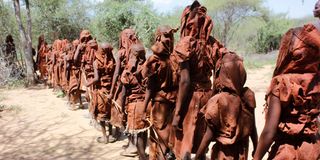Alarm as circumcision rites keep children out of school

Pokot initiates in procession before graduating at Chepturo, Tiaty sub-county in Baringo County on January 23, 2016.
Schools in the county have re-opened to a slow start for the first term of the academic calendar, with most learners yet to report back.
Concern has been raised that children who are skipping school underwent circumcision during the long holiday break.
Primary schools are the most affected by poor attendance, with circumcised boys still camping in forests in line with cultural dictates. Circumcision ceremonies among the Pokot often take place soon after the Christmas festivities.
For years, it has had a negative effect on school attendance.
For boys, the ceremony is conducted annually, while girls are forced to undergo the banned practice in secret, with perpetrators devising clever ways to escape detection and arrest.
Education stakeholders in the county have taken an issue with parents who are perpetuating cultural practices that, they said, are detrimental to their children’s learning.
“Those who went for circumcision should come back. Time is over. Parents and chiefs should ensure learners are back in school,” Kenya National Union of Teachers (Knut) West Pokot County chairman Joel Partich said, urging police officers to team up with chiefs to ensure all learners are back in class. Many schools, especially in North and Central Pokot sub-counties, have seen a high number of children dropping out of school.
“The number of learners in school is still low because many of them went for circumcision, which can take from five to six months,” explained a teacher who sought anonymity for fear of being victimised.
However, he assured parents that teaching will continue with the few pupils available.
“It is a deeply rooted culture. Some parents have openly warned us against trying to interfere,” the teacher revealed.
World Vision Child Protection Officer Teresa Cheptoo urged the government to ensure that girls are retained in schools.
She revealed that, in some cases, parents and guardians cross over to Uganda to subject their girls to female genital mutilation, after which they are married off. Ms Domtillah Chesang, the director of Irep Foundation, a community-based organisation that advocates for the eradication of harmful cultural practices, blamed the trend on poverty.
“There are many economic challenges and people can’t afford food,” she said.
Alale Assistant County Commissioner Maurice Ogweno said chiefs will ensure that perpetrators are brought to book, even as he lamented that those arrested are often released due to lack of evidence.
“We urge the local community to voluntarily give information and evidence when violators are arrested,” he said.
“Parents who continue to allow boys to stay out of school after circumcision risk arrest and prosecution for child abuse,” Mr Ogweno warned. He said such ceremonies should take place during the holidays to avoid disruption of the school programme.
“We have asked chiefs to ensure that all boys attending the cultural festivities return to school immediately, failure to which action will be taken against their parents and guardians,” he said.





